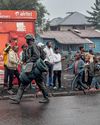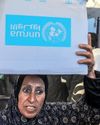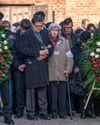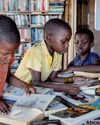
Suha Nasser, 27, a physiotherapist from Jabalia, was sheltering at home with her husband, baby and 31 relatives when their street was bombed.
What was your life like before 7 October?
I met Mohammed at university in 2018 and was immediately attracted to his self-confidence. On top of that, he was kind, loving, supportive and always joking around. We got married in 2019 and I couldn't have been happier, but what followed was our long struggle to start a family.
We travelled to Egypt in May 2022 for a holiday, but found that the cost of fertility treatment in Cairo was much lower. Two weeks after the embryo transfer we had to make the journey back across the border to Gaza, which took two full days, across often dangerous checkpoints. I was exhausted and feared for my unborn child. In April 2023, Ahmed arrived after four years of longing.
A month later, I returned to my job as a physiotherapist at al-Rantisi hospital. I tried to coordinate between being a new mother and work; my husband took care of Ahmed during my shifts and stayed up with him to let me sleep.
What happened when the war started?
I was immediately afraid for the safety of my family. This was compounded by the stress of being a new mother trying to shield my son from the impact of the bombings and the upheaval in our home, which was filled with noise and anxiety. Within four days of the war starting, our home had become a refuge for more than 60 people, mostly relatives of my husband. Some were displaced due to the Israeli army's threat to their neighbourhoods and some due to shelling.
Ahmed had trouble sleeping. Calming and reassuring him was a challenge made more difficult by the [lack of food and nutrition] needed for breastfeeding.
What happened next?
This story is from the August 02, 2024 edition of The Guardian Weekly.
Start your 7-day Magzter GOLD free trial to access thousands of curated premium stories, and 9,000+ magazines and newspapers.
Already a subscriber ? Sign In
This story is from the August 02, 2024 edition of The Guardian Weekly.
Start your 7-day Magzter GOLD free trial to access thousands of curated premium stories, and 9,000+ magazines and newspapers.
Already a subscriber? Sign In

What is DEI and why is Trump waging war against it?
When American voters headed to the ballot box in November, opinion polls suggested the cost of living, immigration and reproductive rights ranked among their biggest concerns.

Who are M23 rebels and why is there fighting in eastern DRC?
The armed group M23 and Rwandan soldiers entered the centre of Goma last Sunday after weeks of advancing on the main city in the Democratic Republic of the Congo's North Kivu province.

Aid distribution What Israel's ban on Unrwa may mean for Palestinians
Israel this week insisted it would not back down over its plan to close the Gaza operations of the United Nations Relief and Works Agency for Palestine Refugees (Unrwa), even though critics said the move would jeopardise urgent humanitarian aid efforts.

Anti-terror strategy failed to stop a killer
Southport attacker's lack of coherent ideology meant the Prevent scheme did not see him as a potential risk, exposing the need for reform
Last writes
Handwriting is disappearing - we are far more likely to use our hands to type or swipe than pick up a pen. But in the process are we in danger of losing cognitive skills, sensory experience and a connection to history?

I just want to hug those girls' Bittersweet joy and relief as freed soldiers return home
Nineteen-year-old Naama Levy became an indelible symbol of Hamas’s 7 October 2023 attack on Israel.

Eighty years after the liberation of Auschwitz, survivors call for courage amid the rise of hatred and antisemitism 'We must avoid the mistakes of the 1930s'
On a day of startling blue skies, Auschwitz survivors stood before princes and presidents on Monday to remind the world, perhaps for the final time, of the horrors they suffered there during one of the darkest moments of human history.

Davos lessons Trump's return heralds new era of harsh global competition
In the heady mountain air of Davos last week, away from the parties and the backslapping tech bros, another, more beleaguered crew touted their wares: the multilateralists.

Can the continent's publishing industry turn a page?
Tsitsi Dangarembga's Nervous Conditions, a novel about growing up in colonial Zimbabwe, is one of the most important works of 20th-century African literature and features on university curriculums across the UK.

Trump has arrived with abang-but can he follow through?
Little more than a week ago, Stewart Rhodes was serving an 18-year prison sentence for seditious conspiracy over his role in a deadly attack on the US Capitol.